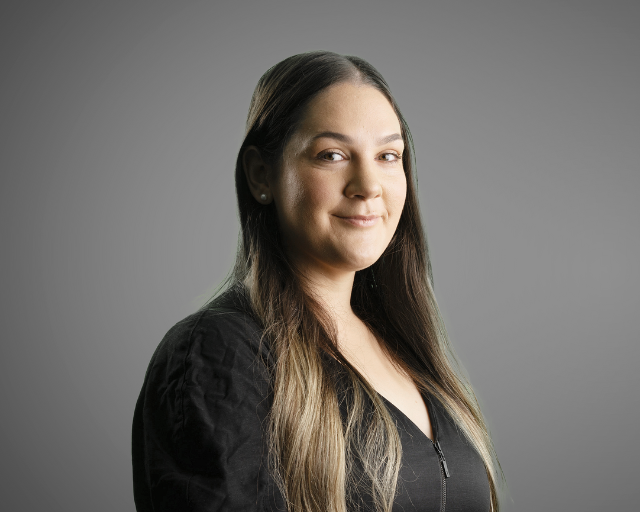A POSTGRADUATE QUALIFICATION IN FAMILY DISPUTE RESOLUTION PRACTICE GIVES YOU AN EDGE
The College of Law helps you gain the skills and accreditation to become an FDRP and guide separating families to resolution without court. Your career is an opportunity to make a greater impact. Postgraduate study gives you the confidence and capability to serve clients at your professional best.
Advance your career by developing the communication, negotiation and case management skills needed to help families reach better outcomes. Study a Graduate Certificate, Graduate Diploma or Master of Laws to build practical mediation and practicum-based experience.
Enhance your professional standing and make a meaningful difference in family dispute resolution.
Scroll down to explore postgraduate FDRP courses and accreditation pathways.
INTAKE 1 STARTS 9 FEB 2026
Book a call back with one of our Customer and Student Engagement Advisors
PROGRAM OPTIONS - FAMILY DISPUTE RESOLUTION PRACTICE
Graduate Diploma of Family Dispute Resolution Practice
5
4 core subjects (FDR1, FDR2, FDR3, FDR4) and FDR5 or 20 hours external practicum
Either a bachelor’s degree (or higher) in a related field, an NMAS/AMDRAS accreditation or experience in a relevant field
7 - 9 months
Master of Laws (Applied Law) majoring in Family Dispute Resolution Practice
8
4 core subjects (FDR1, FDR2, FDR3, FDR4), FDR5 and 3 elective subjects or a second major (4 subjects)
A recognised law degree (LLB, JD, or equivalent)
2 years part-time
Master of Laws (Applied Law) majoring in Family Dispute Resolution Practice and Family Law
9
5 core subjects (FDR1, FDR2, FDR3, FDR4), FDR5 and 4 Family Law elective subjects
A recognised law degree (LLB, JD, or equivalent)
2 years part-time
HAVE QUESTIONS OR WANT TO ENROL
Book a call back with one of our Customer and Student Engagement Advisors at a time that suits you.
FAMILY DISPUTE RESOLUTION PRACTICE SUBJECTS
FDR1 - Family Law and Mediation
Intake FDRPThis subject forms the foundation of the family dispute resolution (FDR) subjects. In this subject students will be introduced to family law and the place of mediation within family law.
Students will acquire the requisite knowledge to enable them, as a family dispute resolution practitioners (FDRP), to contextualise and appreciate each party’s unique situation within the family law framework, and assist each of them to understand their own role and their respective roles in the process.
This subject also discusses where mediation sits on the dispute resolution spectrum and how the process assists in the resolution of family disputes.
TOPICS
- Overview of Australian family law
- Obligations of a family dispute resolution practitioner
- The dispute resolution spectrum
- Conflict analysis and pre-mediation preparation
- Mediation models
- Facilitative mediation process
- Communication skills in mediation Common issues in mediation
FDR2 - Children’s Matters, Family Law and Family Dispute Resolution
Intake FDRPTOPICS
- Defining and understanding families
- Emotional impact of separation on family members
- Children's needs and best interests
- Family law and children's matters
- Parenting plans and parenting orders.
FDR3 - Advanced Family Dispute Resolution
Intake FDRPTOPICS
- Family violence, child protection and the law
- Screening for violence, risk assessment and safety planning
- Techniques for managing volatile clients and situations
- Ethics in family dispute resolution.
FDR4 - Case Management in Family Dispute Resolution Capstone
Intake FDRPTOPICS
- Introduction to family dispute resolution case management Intakes (and variations)
- Assessment for suitability Information and referrals for mediation
- Property matters in family dispute resolution
- Child support assessment formula
- Preparing for and conducting mediation
FDR5 - Virtual Simulated Practice
Intake FDRPThis subject is designed to provide students with the virtual simulation practice in family dispute resolution setting. This subject consists of the items of practical coursework. During this subject, students will be required to lead or co-facilitate on three matters, including: children matters and property matters.
TOPICS
This subject will be conducted over 8 weeks with 5 days online face to face sessions to be spread over 3 weeks. Each student will be allocated three matters and will be required to conduct an intake for each of the matters as well as a mediation session.
Students will also be required to complete several assessments associated with the matters such as written agreements, intake assessment forms and matter analysis.
The online face to face sessions will be conducted in the following weeks: Week 3 – 1 day online face to face; Week 4 – 3 days online face to face; and Week 7 - 1 day online face to face.
Students will be allocated in the groups of four and assigned a supervisor/coach for the assessments and feedback. Successful completion of this subject will provide students with the remaining 20 hours of clinical placement under the FDRP practicum requirements.
START DATES
| Feb Intake 1 | May Intake 2 | Aug Intake 3 | Nov Intake 4 | |
|---|---|---|---|---|
| START DATE | 09 Feb 2026 | 11 May 2026 | 10 Aug 2026 | 09 Nov 2026 |
| CENSUS | 25 Feb 2026 | 27 May 2026 | 26 Aug 2026 | 02 Dec 2026 |
| END DATE | 01 May 2026 | 31 Jul 2026 | 30 Oct 2026 | 05 Feb 2027 |
| Subject | Start Date | Census | End Date | Workshop Date |
|---|---|---|---|---|
| DRP3 - Advocacy | 21 Sep 2026 | 30 Sep 2026 | 30 Oct 2026 |
15-17 October 2026 |
| DRP4 - Mediation | 19 Jan 2026 | 28 Jan 2026 | 27 Feb 2026 |
9 - 13 February 2026 |
| FDR1 - Family Law and Mediation | 09 Feb 2026 | 18 Feb 2026 | 20 Mar 2026 |
Intake 1 |
| FDR1 - Family Law and Mediation | 10 Aug 2026 | 19 Aug 2026 | 18 Sep 2026 |
Intake 1 |
| FDR2 - Children’s Matters, Family Law and Family Dispute Resolution | 23 Mar 2026 | 01 Apr 2026 | 01 May 2026 |
Intake 1, 2026 Intake 2, 2026 |
| FDR2 - Children’s Matters, Family Law and Family Dispute Resolution | 21 Sep 2026 | 30 Sep 2026 | 30 Oct 2026 |
Intake 1, 2026 Intake 2, 2026 |
| FDR3 - Advanced Family Dispute Resolution | 04 May 2026 | 13 May 2026 | 12 Jun 2026 |
Intake 1, 2026 Intake 2, 2026 |
| FDR3 - Advanced Family Dispute Resolution | 02 Nov 2026 | 11 Nov 2026 | 11 Dec 2026 |
Intake 1, 2026 Intake 2, 2026 |
| FDR4 - Case Management in Family Dispute Resolution Capstone | 26 Jan 2026 | 04 Feb 2026 | 06 Mar 2026 |
Intake 2, 2025 Intake 2, 2026 |
| FDR4 - Case Management in Family Dispute Resolution Capstone | 15 Jun 2026 | 24 Jun 2026 | 24 Jul 2026 |
Intake 2, 2025 Intake 2, 2026 |
| FDR4 - Case Management in Family Dispute Resolution Capstone | 25 Jan 2027 | 03 Feb 2027 | 05 Mar 2027 |
Intake 2, 2025 Intake 2, 2026 |
| FDR5 - Virtual Simulated Practice | 06 Apr 2026 | 16 Apr 2026 | 29 May 2026 |
Intake 1, 2026 Intake 2, 2026 |
| FDR5 - Virtual Simulated Practice | 07 Sep 2026 | 17 Sep 2026 | 30 Oct 2026 |
Intake 1, 2026 Intake 2, 2026 |
| LB3 - Business Strategy: Planning for Success | 04 May 2026 | 13 May 2026 | 12 Jun 2026 | |
| LB3 - Business Strategy: Planning for Success | 02 Nov 2026 | 11 Nov 2026 | 11 Dec 2025 |
| Subject | Start Date | Census | End Date | Workshop Date |
|---|---|---|---|---|
| FDR1 - Family Law and Mediation | 09 Feb 2026 | 18 Feb 2026 | 20 Mar 2026 |
Intake 1 |
| FDR1 - Family Law and Mediation | 10 Aug 2026 | 19 Aug 2026 | 18 Sep 2026 |
Intake 1 |
| FDR2 - Children’s Matters, Family Law and Family Dispute Resolution | 23 Mar 2026 | 01 Apr 2026 | 01 May 2026 |
Intake 1, 2026 Intake 2, 2026 |
| FDR2 - Children’s Matters, Family Law and Family Dispute Resolution | 21 Sep 2026 | 30 Sep 2026 | 30 Oct 2026 |
Intake 1, 2026 Intake 2, 2026 |
| FDR3 - Advanced Family Dispute Resolution | 04 May 2026 | 13 May 2026 | 12 Jun 2026 |
Intake 1, 2026 Intake 2, 2026 |
| FDR3 - Advanced Family Dispute Resolution | 02 Nov 2026 | 11 Nov 2026 | 11 Dec 2026 |
Intake 1, 2026 Intake 2, 2026 |
| FDR4 - Case Management in Family Dispute Resolution Capstone | 26 Jan 2026 | 04 Feb 2026 | 06 Mar 2026 |
Intake 2, 2025 6 February 2026 16 - 18 Feb 2026 QLD & WA 3 July 2026 6 - 8 July 2026 QLD & WA Intake 2, 2026
|
| FDR4 - Case Management in Family Dispute Resolution Capstone | 15 Jun 2026 | 24 Jun 2026 | 24 Jul 2026 |
Intake 2, 2025 6 February 2026 16 - 18 Feb 2026 QLD & WA 3 July 2026 6 - 8 July 2026 QLD & WA Intake 2, 2026
|
| FDR4 - Case Management in Family Dispute Resolution Capstone | 25 Jan 2027 | 03 Feb 2027 | 05 Mar 2027 |
Intake 2, 2025 6 February 2026 16 - 18 Feb 2026 QLD & WA 3 July 2026 6 - 8 July 2026 QLD & WA Intake 2, 2026
|
| FDR5 - Virtual Simulated Practice | 06 Apr 2026 | 16 Apr 2026 | 29 May 2026 |
Intake 1, 2026 Intake 2, 2026 |
| FDR5 - Virtual Simulated Practice | 07 Sep 2026 | 17 Sep 2026 | 30 Oct 2026 |
Intake 1, 2026 Intake 2, 2026 |
TEACHING STAFF

Linda Kochanski AM
Practice Area Leader: FDR and Mediation Programs and Director: Amadras Board
HAVE QUESTIONS OR READY TO ENROL?
Book a call back with one of our Customer and Student Engagement Advisors

My studies with the College provided me further insight into where family law is now looking to give some children a voice, particularly regarding parenting plans.
Josephine Byrnes-Luna, FDRP Graduate

Family law can be very litigious, but it doesn't have to be. So my practice in learning more about dispute resolution areas and how to manage dispute resolution and conflict resolution was valuable.
Emma Youdale, LLM Graduate - FDRP





